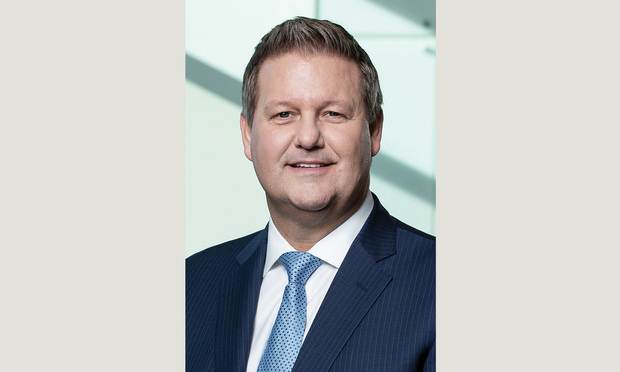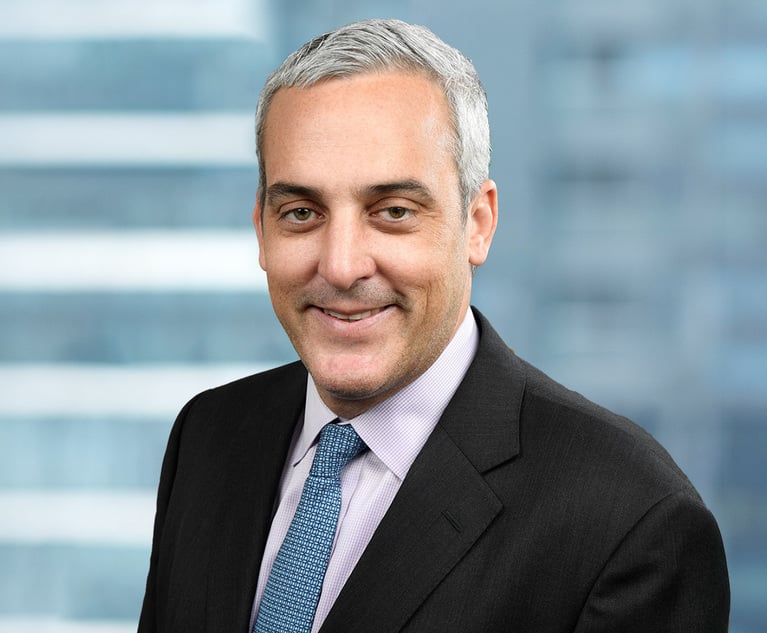Chasing New Frontiers, Brownstein Expands in Nevada and Adds Wyoming Outpost
Already well established in federal lobbying, Brownstein is focusing on expanding its state-level government affairs and regulatory practices.
January 09, 2020 at 01:37 PM
5 minute read
 Neal Tomlinson, shareholder with Brownstein Hyatt Farber Schreck.
Neal Tomlinson, shareholder with Brownstein Hyatt Farber Schreck.
Brownstein Hyatt Farber Schreck, the Denver-based firm that has been clawing its way to the top of the federal lobbying rankings, is absorbing a law and lobbying boutique in Nevada and opening up a new office in Cheyenne, Wyoming, as part of an effort to bolster its state government relations and regulatory bench.
Neal Tomlinson will join the firm as a shareholder, Kristina Kleist joins as a policy adviser and associate and Denise Freeman, who is not a lawyer, will join as senior policy assistant. The three will mostly work out of Brownstein's existing Nevada offices in Reno and Carson City while also spending time in the firm's new office in Cheyenne.
"It was one of those triangulated moments," said Rich Benenson, Brownstein's managing partner. "We wanted to bulk up our Nevada practice. We also had our eye on Neal for a while, and his practice had a presence in Cheyenne, which we believe will benefit our real estate group. And finally, we have a natural resource opportunity that will benefit from having a presence in Cheyenne."
Greg Brower, shareholder at Brownstein and former assistant director for the Office of Congressional Affairs at the Federal Bureau of Investigation, will work with the new team to get them up to speed, the firm said.
Brower previously served as a member of the Nevada Legislature for five regular sessions, including as chairman of the Senate Judiciary Committee and as a member of the state's Gaming Policy Committee.
According to a firm release, Tomlinson's practice "concentrates on administrative law and government relations, including many types of business and privileged licensing, regulatory compliance and related business litigation."
Prior to joining Brownstein, Tomlinson was the managing partner in his own law and government relations firm, Hyperion Advisors. He was previously a partner with Snell & Wilmer.
Kleist's practice focuses on administrative law and government relations, including regulatory and licensing compliance. Prior to joining Brownstein she was an attorney at Hyperion Advisors.
Benenson said that expansion on the state government level is a key priority for the firm that complements the growth of its federal practice in D.C.
"We want to use our success and brand at the federal level to invest in our state practice," Benenson said.
He declined to say what other states the firm might be eyeing, but said it always has a short list of potential recruits.
"My belief is that at the state government relations level, our direction should be about expanding our state practice nationwide without the need for a brick and mortar footprint at each location," he said. "We did brick and mortar in Cheyenne, but our reach expanded much further."
Brownstein has made several moves over the past year that solidify its position as a power player on the federal front. Last year its second-quarter results briefly made it the second largest federal lobbying firm by reported revenue, the firm hired former chairman of the House Committee on Foreign Affairs Ed Royce, and it opened up a new crisis management practice.
This has been part of the strategy all along for Benenson. Before he officially took the reigns at Brownstein in July 2019, he vowed that the firm would be in "perpetual growth mode" when it comes to the D.C. market.
The firm, which will now have 12 offices in the U.S., has seen slow but steady revenue growth over the past decade.
With the exception of slight dips in 2014 and 2017, it has increased revenue every year since 2010, increasing reported annual revenue from $131 million in 2009 to $186 million in 2018.
Cheyenne isn't the first smaller market the firm has entered. In addition to its two Nevada locations, Brownstein currently has offices in Albuquerque, New Mexico, and Atlantic City, New Jersey, to go along with more traditional placements in Los Angeles and D.C.
Brownstein hasn't prioritized growth in cities such as Houston, Seattle, Dallas and Minneapolis that are often next on the list for firms that are already in the largest U.S. markets—looking instead to cities such as like Reno and Cheyene when it comes to smaller market expansion.
"The primary markets and financial centers are saturated," Benenson said. "I think Dallas has become pretty saturated. We are looking at creative opportunities in other jurisdictions that make sense for us."
Those opportunities, according to Benenson, are fueled by potential partnerships with firms that have strong practices in the real estate, government relations and the natural resources sector. The firm's next move, he said, was "unlikely to be a financial center."
Read More
Brownstein Adds Former House Foreign Affairs Committee Chairman Ed RoyceNew
Federal Lobbying Leader? Brownstein Bests Akin Gump in Q2 Revenues
Brownstein Forms Crisis Management Practice Group With Ample DC Footprint
This content has been archived. It is available through our partners, LexisNexis® and Bloomberg Law.
To view this content, please continue to their sites.
Not a Lexis Subscriber?
Subscribe Now
Not a Bloomberg Law Subscriber?
Subscribe Now
NOT FOR REPRINT
© 2025 ALM Global, LLC, All Rights Reserved. Request academic re-use from www.copyright.com. All other uses, submit a request to [email protected]. For more information visit Asset & Logo Licensing.
You Might Like
View All
'A Shock to the System’: Some Government Attorneys Are Forced Out, While Others Weigh Job Options
7 minute read
Latham Adds Former Treasury Department Lawyer for Cross-Border Deal Guidance
2 minute read

Sidley Adds Ex-DOJ Criminal Division Deputy Leader, Paul Hastings Adds REIT Partner, in Latest DC Hiring
3 minute readLaw Firms Mentioned
Trending Stories
- 1Dissenter Blasts 4th Circuit Majority Decision Upholding Meta's Section 230 Defense
- 2NBA Players Association Finds Its New GC in Warriors Front Office
- 3Prenuptial Agreement Spousal Support Waivers: Proceed With Caution
- 4DC Circuit Keeps Docs in Judge Newman's Misconduct Proceedings Sealed
- 5Litigators of the Week: US Soccer and MLS Fend Off Claims They Conspired to Scuttle Rival League’s Prospect
Who Got The Work
J. Brugh Lower of Gibbons has entered an appearance for industrial equipment supplier Devco Corporation in a pending trademark infringement lawsuit. The suit, accusing the defendant of selling knock-off Graco products, was filed Dec. 18 in New Jersey District Court by Rivkin Radler on behalf of Graco Inc. and Graco Minnesota. The case, assigned to U.S. District Judge Zahid N. Quraishi, is 3:24-cv-11294, Graco Inc. et al v. Devco Corporation.
Who Got The Work
Rebecca Maller-Stein and Kent A. Yalowitz of Arnold & Porter Kaye Scholer have entered their appearances for Hanaco Venture Capital and its executives, Lior Prosor and David Frankel, in a pending securities lawsuit. The action, filed on Dec. 24 in New York Southern District Court by Zell, Aron & Co. on behalf of Goldeneye Advisors, accuses the defendants of negligently and fraudulently managing the plaintiff's $1 million investment. The case, assigned to U.S. District Judge Vernon S. Broderick, is 1:24-cv-09918, Goldeneye Advisors, LLC v. Hanaco Venture Capital, Ltd. et al.
Who Got The Work
Attorneys from A&O Shearman has stepped in as defense counsel for Toronto-Dominion Bank and other defendants in a pending securities class action. The suit, filed Dec. 11 in New York Southern District Court by Bleichmar Fonti & Auld, accuses the defendants of concealing the bank's 'pervasive' deficiencies in regards to its compliance with the Bank Secrecy Act and the quality of its anti-money laundering controls. The case, assigned to U.S. District Judge Arun Subramanian, is 1:24-cv-09445, Gonzalez v. The Toronto-Dominion Bank et al.
Who Got The Work
Crown Castle International, a Pennsylvania company providing shared communications infrastructure, has turned to Luke D. Wolf of Gordon Rees Scully Mansukhani to fend off a pending breach-of-contract lawsuit. The court action, filed Nov. 25 in Michigan Eastern District Court by Hooper Hathaway PC on behalf of The Town Residences LLC, accuses Crown Castle of failing to transfer approximately $30,000 in utility payments from T-Mobile in breach of a roof-top lease and assignment agreement. The case, assigned to U.S. District Judge Susan K. Declercq, is 2:24-cv-13131, The Town Residences LLC v. T-Mobile US, Inc. et al.
Who Got The Work
Wilfred P. Coronato and Daniel M. Schwartz of McCarter & English have stepped in as defense counsel to Electrolux Home Products Inc. in a pending product liability lawsuit. The court action, filed Nov. 26 in New York Eastern District Court by Poulos Lopiccolo PC and Nagel Rice LLP on behalf of David Stern, alleges that the defendant's refrigerators’ drawers and shelving repeatedly break and fall apart within months after purchase. The case, assigned to U.S. District Judge Joan M. Azrack, is 2:24-cv-08204, Stern v. Electrolux Home Products, Inc.
Featured Firms
Law Offices of Gary Martin Hays & Associates, P.C.
(470) 294-1674
Law Offices of Mark E. Salomone
(857) 444-6468
Smith & Hassler
(713) 739-1250










